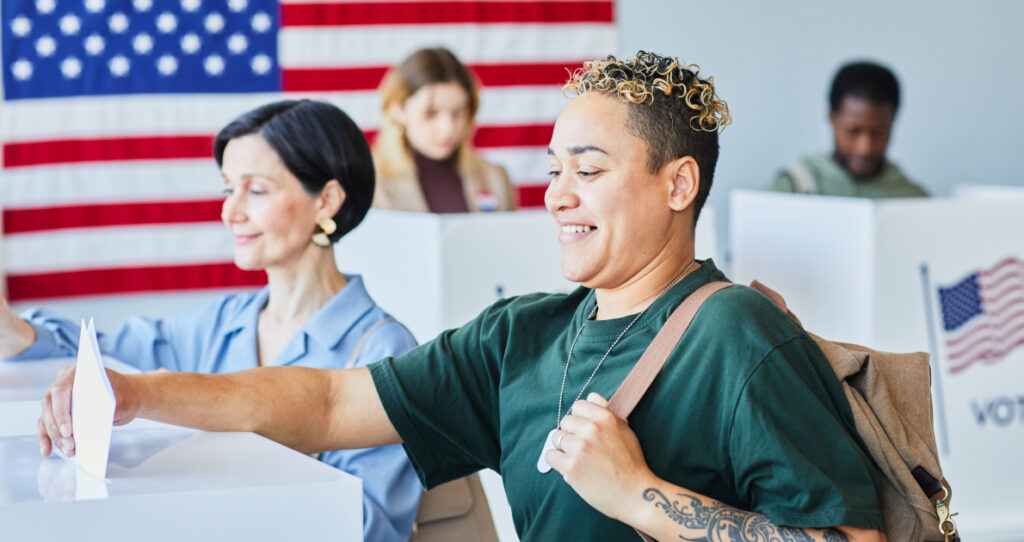Your Guide to Voting in College: Tips for Students and First-Time Voters
Categories: Blog, For College Students, For Cosigners, For Parents and Cosigners, For Schools, For Students

Being a college student means you’re consistently busy. Whether it’s figuring out where to live, what classes to take, or where to buy your books, there’s always something to do. Juggling all those responsibilities might put voting in college at the bottom of your list.
If it’s your first time voting in college, or you’ve recently moved out-of-state for school, here’s a guide to help smooth out the process and ensure you’re ready to cast your vote for the Presidential Primaries happening now until early September 2024. Later in the year, you may also want to vote in General Elections on November 5, 2024 (and of course, snag your “I Voted” sticker).
Why does my vote matter?
While “every vote counts” can sometimes sound cliché, it’s true. In fact, there are approximately 8.3 million newly eligible voters since November 2022. The Tisch College article states that newly eligible voters (ages 18-19) have historically voted at slightly lower rates than their slightly older (ages 20-29) peers. Why is that? Not only is first-time voting complicated, a few of these other factors stand in the way for students who:
- Move states or counties more frequently
- Are less likely to have a driver’s license
- May have to schedule voting around work or classes
Want your voice to be heard? Here’s our guide to getting started and being well-informed when it’s time to fill out your ballot.
How do I find out where and when to vote?
This year, the United States election are scheduled to be held on November 5, 2024. When and where you can vote depends on where you live, which can be confusing so make sure to check Head Count’s polling place locator for any updates as the Presidential Primaries carry on and Election Day gets closer.
Not sure if you’re registered to vote? Head Count helps to verify your registration status in any state.
How do I vote by mail? What is an absentee ballot?
Absentee voting (aka “mail-in voting” and “by-mail voting”) is the process of voting by mail, instead of in-person. You’ll receive a ballot in the mail to cast your vote at home, put it in an envelope or sleeve provided, and then into a separate mailing envelope. For your vote to count, don’t forget to sign the outside of the envelope (this proves you marked the ballot and no one else) before returning it through the mail or dropping it off.
Not only is it convenient to vote at home, you’ll have more time with an absentee ballot to research specific propositions or candidates before making a final decision. Some studies even claim that voter turnout increases with mail-in voting, since financial constraints can sometimes stand in the way of making it to your local polling place on time.
My school is in a different state from where I grew up. Where do I vote?
For this reason, voting in college can be tricky to navigate. It’s important to know that you have the right to vote wherever you consider “home.” You’ll have to check with your home state or the state you go to school in for more information on registration requirements. If you want to vote in your home state’s election while in school, you need to get an absentee ballot. Requesting an absentee ballot differs depending on the state, so check here to see your state’s status on voting by mail.
What can I do to encourage other students to vote?
Want to make Election Day a big deal with your roommates, classmates, and peers? Here’s a few ways to get more people voting in college:
- Volunteer! There are so many ways to support the cause right now, both in-person and online. You can lend your time to Campus Vote Project or get in touch with your local campaign office (CA students, click here) to find out how you can help by making calls or distributing signs.
- Start a campus student vote club. Work with your student government, Student Activities Office, and even fraternities or sororities to create more buzz around voting in college. Collaborate to make the process more fun and sociable (even if it’s in front of a computer). Tip: You can even add the club you created on your resume and LinkedIn!
- Talk about it. Whether you bring it up in your campus club, on social media or through texting a friend, start the conversation around voting in college. The more we help others to understand the process, the less complicated it becomes for younger voters.
Abby Kiesa, director of impact at CIRCLE, a research organization at Tufts University, says it best when she states that, “young people really do have the ability to create change.” Since young voters have the power to shape how our elections shift, we’re all about motivating students to show up for their state (and country) by casting their vote.


